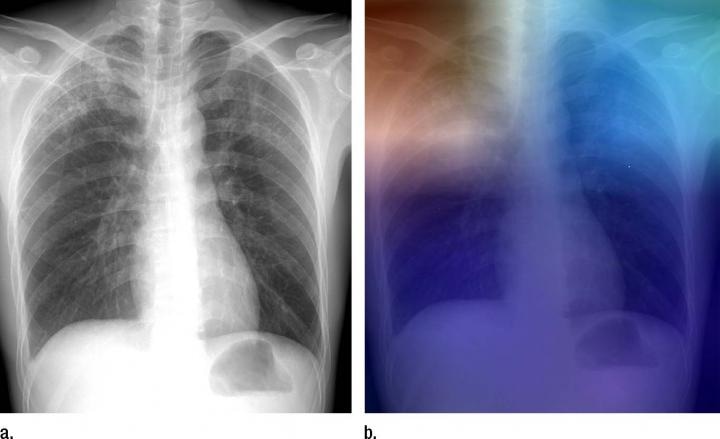Apr 26 2017
 CREDIT: Radiological Society of North America.
CREDIT: Radiological Society of North America.
To help screening and assessment efforts in TB-rampant areas with inadequate access to radiologists, researchers are starting to train artificial intelligence models to detect tuberculosis (TB) on chest X-rays. The work has been reported online in the journal Radiology.
The World Health Organization reports that TB is one of the top 10 causes of death globally. In 2016, about 10.4 million people contracted TB, resulting in 1.8 million deaths. TB can be identified on chest imaging, but in most TB-prevalent areas radiology interpretation expertise to screen and diagnose the disease is not available.
There is a tremendous interest in artificial intelligence, both inside and outside the field of medicine.. An artificial intelligence solution that could interpret radiographs for presence of TB in a cost-effective way could expand the reach of early identification and treatment in developing nations.
Paras Lakhani, M.D., Thomas Jefferson University Hospital (TJUH), Philadelphia
Deep learning is a type of artificial intelligence that enables computers to finish tasks based on current relationships of data. A deep convolutional neural network (DCNN), modeled after brain structure, uses a number of hidden patterns and layers to classify images.
For the research, Dr. Lakhani and his colleague, Baskaran Sundaram, M.D., analyzed 1,007 X-rays of patients with and without active TB. The cases comprised of multiple chest X-ray datasets from the National Institutes of Health, TJUH, and the Belarus Tuberculosis Portal. The datasets were divided into training (68.0 %), validation (17.1 %), and test (14.9 %).
The cases were used to train two diverse DCNN models - GoogLeNet and AlexNet - which learned from TB-positive and TB-negative X-rays. The accuracy of the models was analyzed on 150 cases that were excluded from the training and validation datasets.
The artificial intelligence model with outstanding performance was a blend of the AlexNet and GoogLeNet, with a net accuracy of 96 %.
The relatively high accuracy of the deep learning models is exciting. The applicability for TB is important because it's a condition for which we have treatment options. It's a problem that can be solved.
Paras Lakhani, M.D., Thomas Jefferson University Hospital (TJUH), Philadelphia
The two DCNN models had disparity in 13 of the 150 test cases. For these cases, the researchers assessed a workflow where a professional radiologist was able to interpret the images, accurately diagnosing 100% of the cases. This workflow, which added a human in the loop, had a better net accuracy of close to 99%.
Application of deep learning to medical imaging is a relatively new field. In the past, other machine learning approaches could only get to a certain accuracy level of around 80 percent. However, with deep learning, there is potential for more accurate solutions, as this research has shown.
Paras Lakhani, M.D., Thomas Jefferson University Hospital (TJUH), Philadelphia
Going forward, Dr. Lakhani and team plan to enhance the models with more training cases and other deep learning techniques.
"We hope to prospectively apply this in a real world environment," he said. "An artificial intelligence solution using chest imaging can play a big role in tackling TB."
Source: http://www.rsna.org